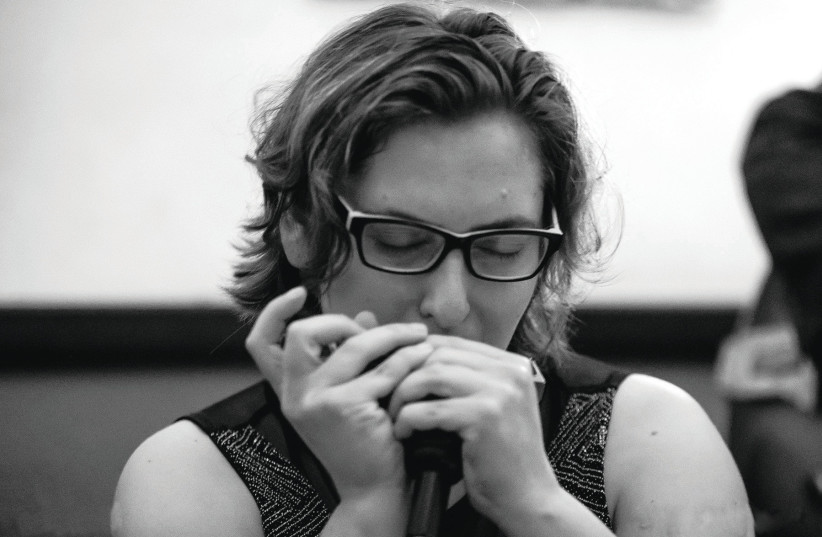Anyone can play the harmonica, right? You just take the inexpensive diminutive piece of metal, with its denture set-like perforations, and blow. I mean, the likes of Bob Dylan, Robert Plant and Mick Jagger managed to find their way around it to decent effect, so why shouldn’t you?
Then again, there are the Larry Adlers of the classical world, blues wiz Paul Butterfield and jazz great Toots Thielemans up there in the pantheon stratosphere. That’s a completely different league of mastery and artistry. And now Jason Rosenblatt is looking to introduce us to some of our very own class acts on the instrument.
Rosenblatt, who made aliyah from Montreal only around a year ago, is already getting in on the cultural scene in his new home, big-time. The fortysomething musician-educator conceived the inaugural Jerusalem Harmonica Festival, which is to take place at Harmony Hall, on Koresh Street, November 10-11.
The two-day program features a slew of stellar acts from a broad disciplinary palette which, besides the Canadian-born founder-artistic director, includes New York-educated jazz virtuoso Roni Eytan, veteran bluesman Dov Hammer, eclectic stalwart Michael Adler, and jazz chromatic harmonica players Yael Feldheim and Yotam Ben-Or. The soloists will be supported throughout by pianist Daniel Schwartzwald, bassist David Michaeli and drummer Ben Silashi.
Not bad going for an oleh hadash.

“I’m excited to make the festival happen,” Rosenblatt states.
Making aliyah slap-bang in the middle of a pandemic may not seem like the best move. But Rosenblatt says things have run relatively smoothly ever since. “My wife and I are both musicians, and one of the things we are really happy about since we came to Israel is that we started working pretty much right away.
“In Canada, everything was shut down because of corona, and you couldn’t even do outdoor performances in Canada from the middle of November [2020]. Here there were outdoor performances sponsored by the municipality.”
And now the municipality is helping Rosenblatt to spread the word that the harmonica is a far more versatile means of making music than most would think.
HE ENCOUNTERED several exponents of mouth organ pyrotechnics along the way who sparked his fervor for the instrument and, eventually, got him on the road to where he is now, a serious, acclaimed performer and educator.
At the age of eight, he caught legendary genre-hopping player Larry Adler doing his peerless thing, when the Rosenblatts spent a vacation in the Catskills, the “borscht belt” where Jews from all over North America flocked for a family time-out.
However, in fact, his initial shove in the desired direction came from far closer to home. His parents were avid folk musicians, and his dad was a member of the folk music society of McGill University in Montreal, where he was studying medicine.
“I found a harmonica lying around at home, and I took to it straight away,” Rosenblatt recalls.
He soon began listening to some of the instrumental greats, such as bluesmen Sonny Terry and Paul Butterfield. Early rock music also informed his evolving musical consciousness, as did the infectious feel-good jazz sounds of gypsy jazz guitarist Django Reinhardt and King of Swing clarinetist Benny Goodman.
He took those sentiments on board and ran with them, and subsequently began branching out into other areas.
Today he describes himself as “a diatonic harmonica innovator who performs early jazz as well as Eastern European and Ottoman-influenced music.”
That’s a pretty expansive stylistic hinterland to feed off, and fuel, and cites highly versatile 70-year-old harp player Howard Levy as the catalyst for his decision to take the craft more seriously.
Rosenblatt says there are few limits to what you can do on the mouth organ. “If you listen to Michal [Adler] or Roni [Eytan], you hear such virtuosity that you imagine you are listening to a violin player. But, actually, you don’t have to imagine. They are playing virtuosic material on the harmonica. It’s got that range to it.”
That, Rosenblatt, notes, is a feature of the chromatic model. He plays the diatonic mouth organ.
“It used to be treated more like a blues machine. You put it to your mouth, you breathe a pattern, and out comes blues,” he chuckles.
“The diatonic harmonica is better for that than the chromatic because you have the ability to bend the notes.”
ROSENBLATT WILL be bending and delighting some ears when he takes the stage on Wednesday, to unfurl a broad ambit of styles and dynamics.
“Shtreimel is probably the project which is nearest to my heart,” he says, referencing the band he founded almost 20 years ago which “offers a high-octane mix of not-so-traditional Eastern European Jewish and Turkish music.”
There seems to be almost no limit to what the man can do on an instrument that is considered by many to be little more than a party piece prop.
One suspects those who go along to Harmony Hall later this week will be summarily disabused of that uninformed image and, like Rosenblatt, Eytan and the rest of artists on the Jerusalem Harmonica Festival bill, will start to take the harmonica more seriously.
For tickets and more information: https://www.jerusalem.muni.il/en/events-and-culture/allevents/harmonica-festival
